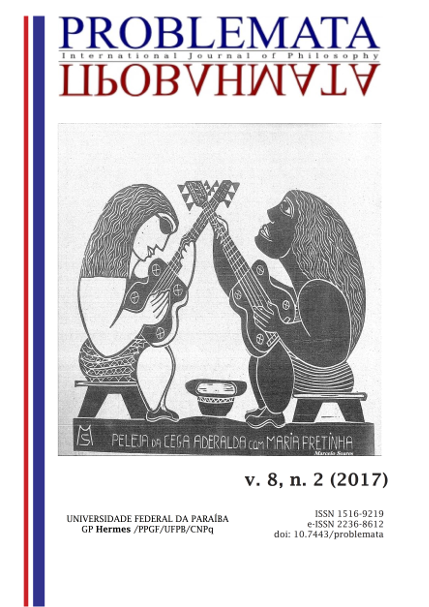A PERSISTÊNCIA DOS PRECONCEITOS
DOI:
https://doi.org/10.7443/problemata.v8i2.31190Keywords:
Preconceito, Iluminismo, Verdade, Afetos, Medo.Abstract
Neste artigo é defendido que ‘os iluministas’ não poderiam ser capazes de eliminar os preconceitos, como pretendiam, haja vista que atacavam o fenômeno do preconceito onde ele não estava, sendo o entrave no acesso à verdade apenas um efeito colateral do preconceito e não seu elemento central. Independente da possibilidade ou não de se eliminar os preconceitos, a estratégia adotada pelos filósofos desse período estava condenada ao fracasso. Para sustentar esta hipótese, primeiro será extraída uma noção geral do preconceito a partir de autores do período do iluminismo. Em seguida serão estudados seus aspectos a fim de compreender a relação dos preconceitos com a realidade. Por fim se demonstra que o caráter dessa relação é acidental, não podendo o preconceito ser abolido por uma argumentação acerca da verdade das coisas.Este artigo não discute se é possível eliminar os preconceitos, apontando apenas o erro do método dos autores modernos.Downloads
References
ALLPORT, Gordon W. (1954): The Nature of Prejudice. New York: Anchor Books edition, 1958. 1-27.
BACON, Francis. Novum Organum. 1620. URL: http://www.dominiopublico.gov.br/pesquisa/DetalheObraForm.do?select_action=&co_obra=2278
CONDORCET, Marie Jean Antoine. (1794) Fortschritt des menschlichen Geistes. In: Was ist Aufklärung: Thesen, Definitionen, Dokumente. 9-18. Stuttgart: Reclam. 2010.
DESCARTES, Réne. Lés Meditations. Prémiere Méditation und Méditation Seconde. 1641. URL: http://www.dominiopublico.gov.br/pesquisa/DetalheObraForm.do?select_action=&co_obra=84335 [Consultado em 20/12/2015]
DORSCHEL, Andreas. Nachdenken über Vorurteile. Hamburg: Felix Meiner Verlag, 2001.
FROMM, Erich. (1941) Die Furcht vor der Freiheit. Trad. Liselotte e Ernst Mickel. München: Deutscher Taschenbuch Verlag. 18. Edição, 2013. 137-151.
HEIDEGGER, Martin (1926) Sein und Zeit. Tübingen: Max Niemeyer Verlag, 2006.
HORKHEIMER, Max. Über das Vorurteil. Köln und Opladen: Westdeutscher Verlag, 1962.
KANT, Immanuel (1784) Beantwortung der Frage: Was ist Aufklärung?. In: Was ist Aufklärung: Thesen, Definitionen, Dokumente. 9-18. Stuttgart: Reclam. 2010.
______. Kritik der Urteilskraft. § 40. 1790. URL: https://korpora.zim.uni-duisburg-essen.de/Kant/aa05/293.html [Consulta em 20/12/2015]
KLEG, Milton. Hate, Prejudice and Racism. Albany: State University of New York Press, 1993. 113-134.
LOCKE, John (1706) Conduct of Understanding. Section X - XII. London: Oxford University press Warehouse, 1881. 29 – 36 URL: https://archive.org/stream/lockesconductofu00lock#page/28/mode/2up [Consulta em 18/12/2015]
______. An Essay Concerning Human Understanding. Chapter XIX. 1689.URL: http://enlightenment.supersaturated.com/essays/text/johnlocke/essay/BOOKIVChapterXIX.html
MORANA, Cyril & OUDIN, Éric (2010) Petit philosophie des grandes idées: La Liberté. Paris: Groupe Eyrolles.
THOMASIUS, Christian. (1691) Der richtige Gebrauch der Vernunft. In: Was ist Aufklärung: Thesen, Definitionen, Dokumente. 9-18. Stuttgart: Reclam. 2010.
Downloads
Additional Files
Published
Issue
Section
License
Authors who publish with this journal agree to the following terms:
- Authors retain copyright and grant the journal right of first publication with the work simultaneously licensed under a Creative Commons Attribution License that allows others to share the work with an acknowledgement of the work's authorship and initial publication in this journal.
- Authors are able to enter into separate, additional contractual arrangements for the non-exclusive distribution of the journal's published version of the work (e.g., post it to an institutional repository or publish it in a book), with an acknowledgement of its initial publication in this journal.
-
- Authors are permitted and encouraged to post their work online (e.g., in institutional repositories or on their website) prior to and during the submission process, as it can lead to productive exchanges, as well as earlier and greater citation of published work (See The Effect of Open Access).





